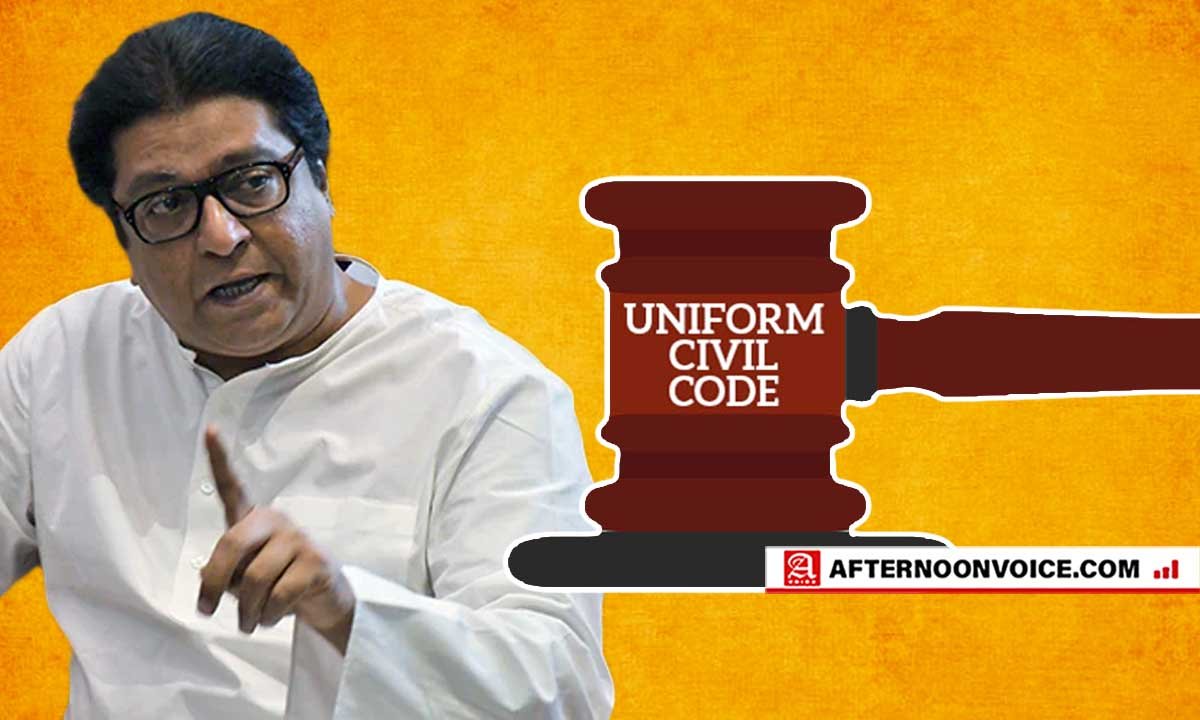
Raj Thackeray held a rally in Pune amongst heavy deployment of police force at Ganesh Kala Krida Manch of the city to maintain the law-and-order situation. The rally was peaceful and the first time for a change even the media was not over reactive. He looked tired and unwell but his attack was powerful. While speaking he urged Prime Minister Narendra Modi to bring the Uniform Civil Code at the earliest and also to bring a law on population control. This is not the first time that the MNS chief voiced his support for the Uniform Civil Code, but his appeal to PM Modi comes at a time he is at the centre of the Hanuman Chalisa controversy following his threat to play Hanuman Chalisa at mosques if illegal loudspeakers are not taken down. He also said Aurangabad should be renamed Sambhaji Nagar after Maratha ruler Sambhaji.
Well, if we speak about uniform civil code, as a civilisation, we have evolved & progressed into a modern society. And modern society needs to treat every individual the same irrespective of personal laws or religious laws. Bringing everyone under one & the same law is very important. A true secular nation is when people irrespective of religion, caste, and tribe follow one law. Almost all countries have had a Uniform Civil code for ages but with different names. This also means an end of religion-based laws to govern people
For a large part of India’s history post-independence, due to the existence of several religions, there was often unwillingness to approach a common law for the entire nation. However, when it came to matters for Hindu faith, laws which didn’t allow equal inheritance by sons and daughters, or matters of divorce (considered back then as taboo), a law was enacted called Hindu Marriage Act, 1955. This to a huge extent settled all discrimination faced by Hindu women.
Now fast forward to days of 1985, there was this Shah Bano case, where a Muslim lady of 62 years was divorced by saying the word “talaq” (meaning: divorce) three times, a practice common in some Muslim societies. This matter went up to the Supreme Court, which declared this wrong and unjust. But then, there was a backlash from the Muslim community, led by All India Muslim Personal Law Board (AIMPLB), who saw this as an “attack on their faith”, resulting in the then Prime Minister Rajiv Gandhi to pass an ordinance to overrule Supreme court’s judgement. This action was something seen by many as a clear case of appeasement politics in India, something which plagues Indian politics even to this date. Now under BJP rule, The Muslim Women (Protection of Rights on Marriage) Act, 2019 declares the instant divorce granted by pronouncement of talaq three times as void and illegal. It provides for imprisonment for a term up to 3 years and fine to the husband who practiced instant Triple Talaq. With time the amendments are taking place.
Article 44 of the Constitution of India writes, ’The State shall endeavour to secure for the citizens a uniform civil code throughout the territory of India.’ A civil code refers to laws that deal with civil matters like marriage, divorce, adoption, succession and inheritance. Presently such matters are generally governed by personal laws in India which has multiplicity of such laws (Some of the important personal laws practised in India include, the Hindu Marriage Act, 1955, Indian Divorce Act, 1869, Christian Marriage Act, 1872, Indian Succession Act, 1925, Parsi Marriage and Divorce Act, 1936 etc.).The issue of uniform civil code had become debatable in the Constituent Assembly itself and amendments were moved to protect personal law of any group, community or section of the people. There was an objection that such a code would infringe the right to freedom of religion as enshrined in article 25 of the Constitution. Further, it might amount to tyranny to the Minorities.
The basic idea of proposing a Uniform Civil Code was to detach religion from personal laws and also from social relations or, from rights of parties as regards inheritance or succession. Thus, the proposed code believes in unifying and consolidating the nation by every means without interfering with religious practices. Moreover, a common code will help the cause of national assimilation by removing the paradoxes based on ideologies.
Whatever can be the arguments but there is no denial that only Uniform Civil Code can lead us towards real secular India. Muslims of India must wake up and see the reality of narrow-minded religious zealots of their own faith and help in providing justice to the victimized women of their religion. In India criminal code applies equally to all citizens irrespective of their identity. You murder someone, you go to jail. Even civil matters in the public domain that relate to contracts, copyright, torts apply equally to everyone, irrespective of their beliefs, caste or religion. Citizens of one country cannot and should not be guided by differing laws. The protection and due process of law is the birth right of every citizen without distinction and its limited application in any sphere is not only legally untenable but also against the spirit of a nation and equality of its citizens. This situation of having differing Laws based on identity is a doctrinal aberration and should be dispensed immediately.

